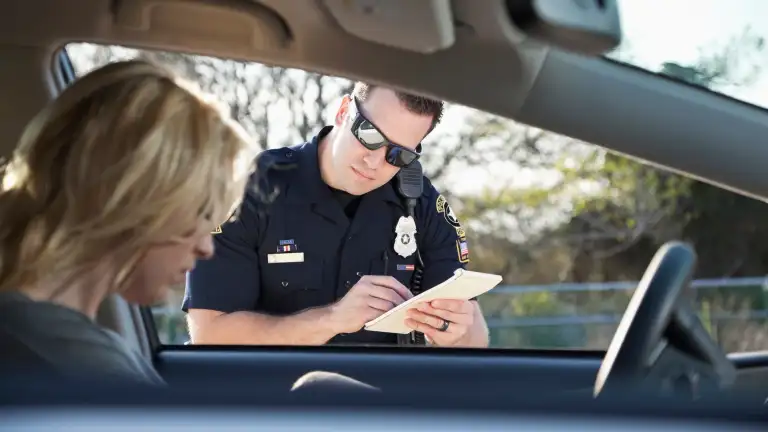
If you get a traffic ticket and don't pay or dispute it, there are major consequences down the road.
You just got a traffic ticket. What do you do? You could decide to accept the ticket and pay the fine. On the other hand, you may feel the ticket is unfair and you want to dispute it. Learn the steps you can take to deal with a traffic ticket.
What you should know
“I was so happy when I became a new driver. I thought I knew the rules. So I was surprised when a police officer pulled me over and gave me a ticket for distracted driving. My phone was in a cup holder, connected to the car by a charging wire. The screen was off and I wasn’t using the phone. Because I’m an N driver, getting a ticket is serious. That’s why I’m fighting it in court."
– Ayva, New Hazelton, BC

When you get a traffic ticket (also called a violation ticket), read the front and back of it carefully. It will look like this. The front of the ticket should:
have your name, contact information, and driver’s licence number
have the date, time, and location of the offence
say which driving rule — like distracted driving, speeding, or failing to wear a seatbelt — the officer believes you broke
show the ticket amount (total of the fine plus a 15% victim surcharge levy)
list a street address where you can personally drop off a dispute notice
be signed by the officer (your signature is not required)
On the back of the ticket you’ll find information on how to either pay or dispute the ticket. Carefully check the time limits set out for disputing your ticket. Most tickets must be disputed within 30 days, though some have shorter time limits.
Large versus small errors
If one or more of the items listed above are missing, and you dispute the ticket, it’s possible it could be tossed out. But the ticket wouldn’t be set aside for small errors, like a misspelled name, incorrect address, or reference to the wrong section number of BC’s driving law.
The most common type of penalty for a violation ticket is a fine. But you could also end up with driver penalty points. These go on your driving record when you get a ticket for certain traffic violations.
Penalty points can raise your insurance premiums. If you have four or more driver penalty points in the previous year, ICBC charges you a driver penalty point premium. This is an extra amount that gets added to your vehicle insurance when you renew it. It starts at $252 for four points and increases for every point you accumulate, up to $34,560 (!) for 50 or more points. Too many points can also result in a driving prohibition.
ICBC’s website lists the fines and points for BC traffic offences. It also lists all the driver penalty point premiums.
When you get a traffic ticket, you might feel like you have to pay it. But in fact you can decide to:
pay the ticket amount,
fight the ticket, or
do nothing.
Most tickets must be paid or disputed within 30 days. But, check the ticket carefully in case there is a shorter time limit.
If you’re considering paying the ticket, keep in mind that sometimes the fines involved can be hefty. There can also be other consequences, like the temporary loss of your driving privileges. You'll want to give this decision your full attention.
If you do nothing
If you don’t pay or fight the ticket within the time limit, you’ll be treated as if you’ve pled guilty. This means:
you owe the ticketed amount,
you won’t be able to renew your car insurance or your driver's licence until you pay the fine or otherwise deal with the ticket, and
the government could hire a collection agency to try to get the money from you.
So, while you may not want to deal with the ticket, ignoring it may ultimately cause you more problems.
If you decide you agree with the ticket, it’s the same as pleading guilty. That is, you agree you broke the law and will pay the fine (plus live with any driver penalty points, if they apply). You won’t have to go to court. But you’ll be convicted of the driving offence and the ticket will be listed on your driving record.
You have to pay the ticket amount usually within 30 days of the violation date. (Check the ticket carefully for time limits.) The good news is that most tickets over $58 are reduced by $25 if you pay them in full within 30 days.
Options for how you can pay
You can pay the ticketed amount:
by mail (with a cheque or money order)
by phone (with a credit card)
online at PayBC (with a credit card), if your ticket starts with the letter E or the letter S
in person (with a credit card, debit, or cash) at your financial institution, most Autoplan brokers, any driver licensing offices, government agent offices, and court registries
The back of the traffic ticket and ICBC’s website have more details about how to pay the ticket, including the mailing address and phone number to call.
If you disagree with the fine amount or want more time to pay, you have to file a notice of dispute, usually within 30 days. (See step 4 below under work out the problem.) But you may not have to appear in court (see here) if you also provide:
a statement that you don’t want to appear in person for a hearing of the dispute, and
written reasons (or a form) explaining why you’re asking for the fine to be reduced or for more time to pay.
The court will notify you in writing if your application is successful.
Work out the problem
When you get a traffic ticket, you’ll need to figure out what to do. Start by carefully reading the ticket (front and back). This will help you make a decision.
On the back of the ticket, there’s information about the steps you need to take if you want to pay or dispute it. Check the time limits set out for disputing your ticket.
See the section above on what you should know for more on what you can learn by reading the ticket.
After you’ve read the ticket, make some notes about the situation and take photos as soon as you can (when you're safely parked, of course).
For example, if you got a distracted driving ticket, jot down details about what happened, including:
The date and time of the incident.
Who else was in the car with you, if anyone.
Details about your phone: where exactly it was in the car (mounted or loose on the passenger seat, for example), your handling of it, whether it was on, and whether it was connected to any wireless technology.
What the officer said to you about the driving offence. For example, did they tell you they saw you using your phone or that they took a photo or video of you using your phone while driving?
What you said to the officer. It’s generally best to be polite and not say anything to the officer at all. But, if you did, write down what you said, particularly if you told the officer you were, for example, using your phone to check what time it was.
You (or your passenger) can also take a photo of where your phone was at the time you got the ticket. If there was a passenger in the vehicle, ask them to write down what they saw and heard.
Stay organized. Keep your ticket, your notes, and all your evidence in one place, like in a file folder or on your phone or computer.
Once you’ve read the ticket and made some notes, you’ll need to make a decision. You can:
pay the ticket amount,
fight the ticket, or
do nothing.
Most tickets must be paid or disputed within 30 days. But, check the ticket carefully in case there is a shorter time limit.
See the section above on what you should know for more on these options.
You may decide to dispute your ticket if you believe it’s unfair and you disagree with the charge. You can also dispute the ticket if you agree with the charge but want to pay less or want more time to pay.
Pay close attention to the timing
Either way, you must file your dispute typically within 30 days of the date of the violation ticket. (Check the ticket carefully for time limits.) If 30 days have passed, you’ll have to file a form to ask the court to give you an extension to file a dispute. You’ll need to explain why you missed the deadline and state that you intended to dispute it.
How to file your dispute
You have options in how you file your dispute. You can file a dispute in person by taking the ticket and your driver’s licence to any BC driver licensing office or provincial court registry.
Alternatively, you can file your dispute by mail. One way to do so involves filling out a notice of dispute form (available on the BC government website). If you just want to ask for the fine to be lowered or to have more time to pay, you also have to fill out the violation ticket statement and written reasons form. By doing this, you won’t have to go to court. (A judge will look at your forms and notify you in writing of a decision.)
A second way to file your dispute by mail is by writing a letter saying you’re disputing the offence or the fine. You must attach a copy of the violation ticket with your letter. In your letter, you’ll also need to include the following:
the law and section number of the offence stated on the ticket (if that’s what you’re disputing)
the reasons why you’re disputing the fine amount (if that’s what you’re disputing)
the ticket number and violation date
your full name, address, driver's licence number, and date of birth
Once you’ve filled out the paperwork, mail it to:
Ticket Dispute Processing
Bag #3510
Victoria, BC, V8W 3P7
Your dispute has to be postmarked within 30 calendar days from the date the ticket was served to you.
More on how to dispute a ticket
The back of the traffic ticket and ICBC’s website has more information about how to dispute a ticket. The Provincial Court of BC's website also explains how to dispute a ticket.
If you’ve disputed the ticket, the court will mail you a notice of hearing with the date and location. It may be many months before you receive this notice. (If you don’t receive a notice within six months, you can contact ICBC to follow up.)
In the meantime, you can get ready for your hearing. If you’d like, you can hire a lawyer to help you with your case. Or, you can represent yourself. Here are some things you can do:
Review your notes and any photos you took after you got the ticket.
Send a written request to the police officer (named on the ticket) for a copy of all the information they have about the offence, including:
the officer’s notes made at the time of the offence and since that time (as many officers use codes in their notes, ask for a typed copy and an explanation of any codes used)
any video or audio recordings made
the names of the witnesses that will be attending the hearing and any statements made by them
the calibration and maintenance records of any laser or radar gun, breathalyzer or other device the officer was using at the time of the offence
Think about your legal defence(s). The most typical defence is that you didn’t do what the ticket says you did. Take a moment to look up the law. This can help you to understand the parts of the offence and figure out what defence to put forward in your case.
Prepare questions you want to ask the officer and any other witnesses. This is one way you might be able to create doubt about the officer’s evidence.
Make three copies of any photos or other documents you want the court to consider.
You can also look up BC court decisions and print them out. This research can help you understand what courts have said about the driving rule noted on the ticket. Make sure the cases you look at are similar to what happened in your situation.
You can also look up the driver penalty points, if any, for the driving offence.
To stay organized, you may want to make a tabbed binder with all your documents, evidence, and any printouts of the law.
On the court date, you (or someone on your behalf) must attend court at the time and location set out in the hearing notice. Make sure you:
dress comfortably but respectfully
take your materials, a pen, and a pad of paper or your laptop to make notes
arrive 30 minutes early
turn your cellphone off
Consider approaching the officer
If the officer who gave you the ticket is there, and you’re thinking about pleading guilty, consider approaching them before the hearing to talk about the ticket. Stay calm and be polite, and tell them you want to talk to them “without prejudice.” (This means they agree not to use what you say against you in court.)
The officer doesn’t have the ability to reduce penalty points for an offence. But, if you’re flexible and show remorse, it’s possible that the officer may agree to reduce the charge to avoid or lessen penalty points. Or, they may agree to reduce the fine. It’s rare that they’ll agree to withdraw a ticket altogether.
If the officer isn't there
It’s possible the officer in your case doesn’t come to court. This is rare, though, because officers are obligated to attend and hearings are typically scheduled based on the their work calendar and availability. If the officer doesn’t attend either in person or by phone, ask that the ticket be dismissed. You don’t have to say or prove anything. Typically, in that situation, the justice will tell you that you’re free to leave (basically throwing out the ticket).
Either way, it’s worth it to attend court and to be prepared. There’s a possibility that you could end up not having to go through a full hearing or that you’ll get to pay a reduced ticket amount.
If your hearing is going ahead, it will be heard by a judicial justice.
At the hearing, the officer and any other witnesses will go first. They’ll tell the court what they saw. You can ask the officer and their witnesses questions. If they don’t give any evidence or not enough evidence in the hearing, the justice will not find you guilty.
You’ll also have a chance to say what happened. After you give your evidence, each of you and the officer will have an opportunity to summarize your case. The justice then decides whether you’re guilty or not.
If you’re found guilty, the justice will give you a penalty, usually a fine. The justice can consider your driving record when deciding on a penalty. In more serious cases, the justice may order you not to drive for a period of time.
You can ask for a lower fine (though there are some fines a justice can’t reduce because a minimum fine is set by law). Or you may ask for time to pay. A justice can’t reduce any driver penalty points.
The Provincial Court of BC’s website has more on traffic court hearings.
Common questions
There are different fines for different offences. ICBC’s website lists the fines and penalty points for BC traffic offences. If you can’t find the offence you’re looking for, take a look at the BC Motor Vehicle Act Regulations.
No. All tickets and penalty points stay on your BC driving record for five years. (But, they actually become part of a permanent driving record that can be produced at trial if necessary.)
You can dispute penalty points, though, by disputing the ticket you received. (See step 4 above under work out the problem.)
If you have four or more penalty points, you can lower or eliminate your driver penalty point premium by temporarily giving up your driver's licence.
You must attend court on the hearing date. If you can’t attend, you can send a family member, friend, or lawyer to appear on your behalf. They can’t tell your side of the story. But they can:
negotiate with the officer before the hearing,
tell the court whether you agree or disagree with the traffic ticket,
ask the police officer any questions, and
make legal arguments for you.
If neither you nor anyone else on your behalf can attend court on the hearing date, you have two options. You can:
Ask the court to postpone the hearing. You have to fill out and mail an application to adjourn a hearing form. You can also get this form in person from any court registry.
Ask for a new hearing date. You have to file an affidavit at any court registry. You can use this option if you missed your hearing through no fault of your own.
Or — if you really can’t attend on the hearing date — you can ask to reschedule. This might work in your favour. Police often group their tickets together to deal with them in court on the same day. It’s possible that your new date may not work for the officer and they may be a “no show,” resulting in the ticket being tossed out.
If you don’t appear in court on the hearing date and don’t file anything, the ticket is treated as undisputed. You have to pay the full amount of the ticket and a conviction is added to your driving record.
Who can help

Violation Ticket Centre
BC government office explains how to pay or dispute a provincial traffic ticket.

Access Pro Bono's Free Legal Advice
Volunteer lawyers provide 30 minutes of free legal advice to people with low or modest income.

Access Pro Bono’s Everyone Legal Clinic
Clinicians provide affordable fixed-fee services on a range of everyday legal problems.

Lawyer Referral Service
Helps you connect with a lawyer for a complimentary 15-minute consult to see if you want to hire them.

BC Legal Directory
Search for a lawyer by community or legal issue. From the Canadian Bar Association, BC Branch.


